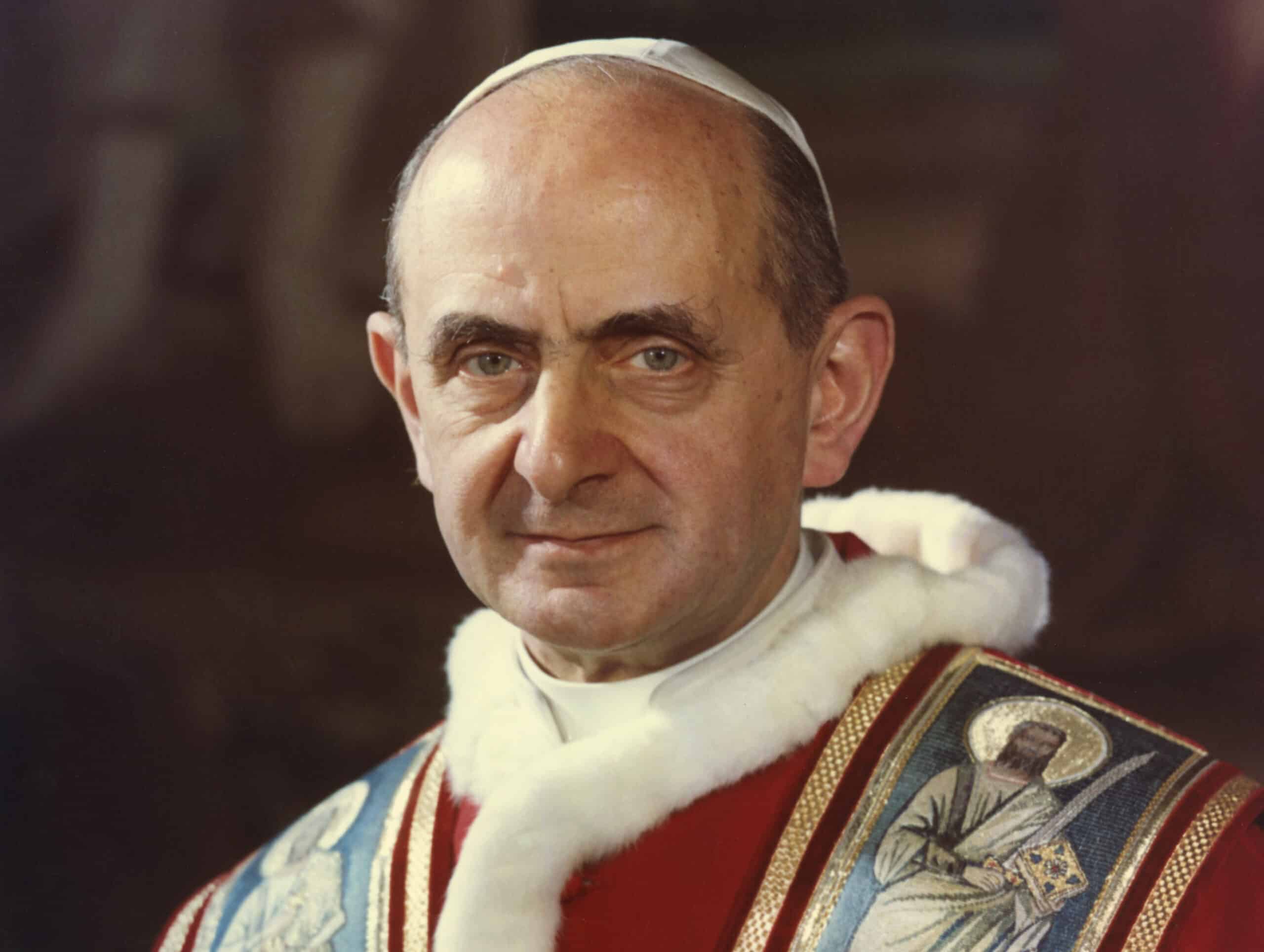As we make our way through life as Christians, some signposts are clearer than others. Out of love for God and neighbor we will not kill, steal or commit adultery. Other signposts are harder to see. But they can become clearer over time when the results of ignoring them are writ large.
When the birth control pill was developed in the 1960s, many people thought it would bring great benefits. Contraception would free women from fear of pregnancy, allowing men and women to love each other fully and have children only when ready. Abortion, child abuse and out-of-wedlock births would be reduced or eliminated.
When Blessed Pope Paul VI issued his encyclical Humanae Vitae in 1968, he saw a different future. He thought readily available contraception would weaken, not strengthen, fidelity in marriage. He feared it would liberate not authentic love but rather a selfish desire allowing men to treat women as sex objects. Governments would promote birth control, intervening in what should be a private decision for couples. Many Catholics were skeptical of these predictions and disappointed in the encyclical.
After 50 years, we can take a new look. The problems contraception was thought to solve are worse. We see more infidelity, divorce and sexual harassment and abuse of women. Governments have vast programs for population control, not all of them voluntary.
It’s natural to ask: Why did Paul VI see the future more clearly than his critics? With the aid of our Christian tradition, did he see more deeply into the truth about marriage and sexuality?
A deeper vision
Here’s a strange fact. Every other system of the body — breathing, circulation, digestion and so on — is designed for our own survival and development. The sexual aspect of our bodies — which even Planned Parenthood calls “the reproductive system” — is different. It is for going out of ourselves, for uniting with another person and ensuring the survival and development of someone else who will need our unconditional love to thrive.
And because we like to think of ourselves first, it is the only bodily system that modern medicine turns against. We are sold drugs, devices and surgeries — even those with bad effects on our overall health — to make this one healthy system stop working.
Our Catholic faith adds its own insight. Our bodies are “temple[s] of the Holy Spirit” (1 Cor 6:19), as are the bodies of any children we conceive. When a man and a woman give themselves to each other in committed love, their bond is a sacrament, a symbol of Christ’s union with his Church. And when their love conceives a child, they cooperate with God to create a human person, body and soul, with his or her own innate dignity and eternal destiny. This power to be “co-creators” with God deserves our respect.
Paul VI sought to defend these two gifts from God, the “unitive” and “procreative” meanings of sexuality. Marital love is about bonding with each other forever and being open to a child who may result from that union. To quote Pope St. John Paul II, they are both ways in which “life attains its fullness in the sincere gift of self” (Evangelium Vitae, No. 86).
These two meanings imply and support each other. Marital commitment must be permanent so children can be sure of both parents’ love and support throughout childhood. And openness to having a child with each other makes married love deeper and richer.
The love both parents have for a child arising from their love for each other is unique. In the Middle Ages, theologian Richard of St. Victor compared it to the love among the persons of the Holy Trinity, coining a new word for it: condilectio, or co-loving.
Therefore when we “free” sexual love from openness to life, we do not set free the love between man and woman — we make it a less complete gift of self. What is set free from fully authentic love is a more selfish desire, with the consequences we have seen over half a century.
It was to preserve the fullness of marital love that Paul VI taught we should never directly intervene in our acts of marital love to suppress that procreative meaning.
Does the Church oppose all family planning?
No. Paul VI endorsed “responsible parenthood.” He said a couple may have serious reasons for wanting to delay having a child. But not every means to that end is equally good. Is there an approach to family planning that respects that power to work with God to create a human life, even when we have a good reason not to exercise it right now?
| A Different Approach |
|---|
|
Some Catholics ask whether there is a moral difference between contraception and NFP. But our moral life has many important distinctions that may not be obvious at first. We should not lie but may be silent if telling the whole truth about someone is hurtful. We must never attack human life but may sometimes respect life’s natural limit by discontinuing life support measures.For couples with a lived experience of NFP, the difference is not an abstraction. Women become more attuned to the natural state of their bodies, and husband and wife must communicate more fully in this cooperative approach — neither can say to the other that family planning is “your problem.” Some health-conscious couples embrace NFP to be free from the adverse effects of contraceptive drugs and devices, respecting the “human ecology” of their bodies. The time of abstinence from sexual relations can be a difficult challenge. It demands patience and a willingness to learn how to show love in nonsexual ways. Couples educate themselves in the difference between love and selfish desire. This time also has its reward when they are able to reunite with each other completely. Not many NFP couples complain that over time the passion has left their marriage. |
The answer lies in an approach known as fertility awareness or Natural Family Planning (NFP). It is based on the fact that a woman is only fertile for a few days in each reproductive cycle — NFP consists of learning how to read the signs indicating this time. The couple can choose to have sexual relations at all other times if they want to delay having a child. Married couples with fertility problems can have relations during the fertile time to increase their chance of conceiving. This approach works with a woman’s natural cycles rather than against them.
Decades ago this approach relied on estimating a 28-day reproductive cycle and was called the “rhythm method.” It did not work very well for women with irregular cycles. Modern methods are much improved, relying on the signs of fertility as they arise here and now.
The issue of abortion
Access to contraception has not reduced abortions. Instead, sexual activity outside marriage has increased and led to more unintended pregnancies and abortions. The U.S. Supreme Court has even said it must maintain a “right” to abortion because so many Americans rely on abortion “in the event that contraception should fail.”
As Pope St. John Paul II has asked: Once we decide that the life that may have resulted from our actions is “an enemy to be avoided at all costs” (Evangelium Vitae, No. 13), are we not more ready to attack that life if contraception fails? And unintended pregnancies that occur while using contraception more often end in abortion.
Some drugs and devices considered contraceptive raise this problem more directly by sometimes acting not to prevent the meeting of sperm and egg but to interfere with the survival of a new life already conceived.
Contraception and abortion are different, and the latter is far graver. But in deciding about family planning, we should also recognize the potential link between them.
Are we left alone to deal with this issue?
Paul VI saw that couples need more than clear teaching. They need to accept the unconditional love of God, who wants only what helps us flourish in love for each other and our families. He will answer prayers for his grace and guidance. For those who falter, God’s mercy is boundless. He always calls us back to each other and to him.
As Pope Francis has said, the Church is a “field hospital” for souls. It sponsors marriage preparation as well as instruction and counseling in Natural Family Planning. It offers God’s mercy and encouragement through the Sacrament of Reconciliation and has a special program called Project Rachel for those involved in abortion. No problem, difficulty or sin is beyond the reach of God’s love and grace.
Here, as in many areas, a Catholic way of life is countercultural, a “sign of contradiction.” It does this not to be contrary but, rather, to show a better path that preserves love for each other and for God as the center of our lives. On this path we will never walk alone, and we will teach our families and other couples about the true meaning of love.
Richard M. Doerflinger, former associate director of the Secretariat of Pro-Life Activities for the U.S. Conference of Catholic Bishops, writes from Washington.





